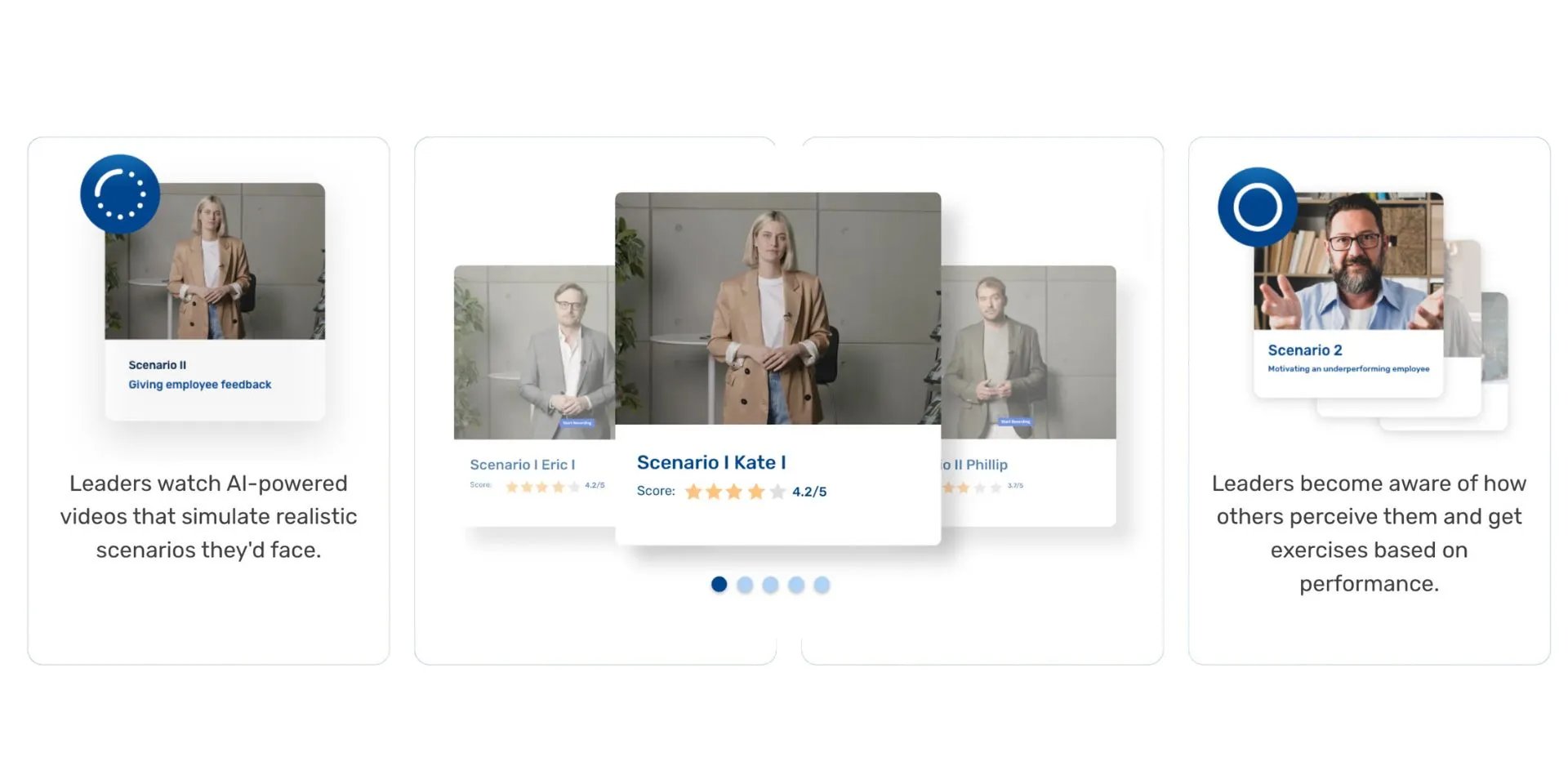Being a good leader is more than just having a glass office, a fancy job title, and a team that supports you. It is about having the ability to communicate effectively, motivate employees, provide ongoing inspiration to your team, and deliver creative solutions that keep everyone in the organization safe and happy.
Sounds like a lot of skills to tick off the list, right? Those are just some of the leadership qualities that the Economic Forum's list of top 15 workforce skills of 2025 is listing.
Soft skills are the hard currency in a successful workforce. With that being said, companies investing in soft skill development will gain the key to building effective leaders in 2024 and the years to come.
What's in this post?
What are leadership soft skills?
Starting off with the basics - soft skills are best described as characteristics and abilities that people need to help them develop strong connections with others. For example, personality traits such as empathy, authenticity, and compassion are soft skills that will help people to interact successfully with other individuals.
As for leadership soft skills, it is essentially soft skills that leaders require in order to successfully lead an organization and their team to success. Leadership soft skills play a pivotal role in demonstrating how leaders interact with stakeholders, clients, and people across teams, how they perform their tasks, make decisions, solve problems, and build professional and interpersonal relationships.
Why are leadership soft skills important for leaders?
With recent challenges such as the COVID-19 pandemic, leadership soft skills have become more critical than ever as remote and hybrid work models are gaining popularity. Leaders with strong soft skills are able to cultivate stronger trust and develop high-performing geographically dispersed teams.
Organizations that prioritize the development of soft skills within their leaders are better able to create a corporate culture that is impactful, inclusive, and adaptive. Prioritizing leadership training to upgrade leadership skills from poor communication to effective communication, companies gain a stronger competitive advantage and build leadership roles that are prepared to retain, engage, and motivate employees in the long run.
Furthermore, leadership soft skills are vital as they help leaders to build confidence in their role. When looking at your organization, wouldn't you want to have leaders who are confident in their position as a leader, know how to manage challenging situations efficiently, and deliver impressive work outcomes as a result of their increased confidence?
Companies that provide soft skills training will gain good leaders who know how to inspire teams, navigate their teams to complete projects successfully, have strong decision-making skills, resolve conflicts, and efficiently delegate tasks.
The important leadership soft skills for 2024
The majority of business leaders already know the importance of soft skills when it comes to leading a powerful team. However, as the business landscape has gone through its fair share of changes and challenges, some soft skills have shifted their priority positions.
Every soft skill is essential in building and improving every leadership role However, to become an effective leader in 2024, there are certain soft skills that will allow your company to stay ahead of the curve and bring your leaders to the forefront of leadership.
Here are the most important soft skills for leadership in 2024.
Emotional Intelligence
Emotional intelligence is one of the leading soft skills in leadership for this coming year. Experts placed strong emphasis on that the hallmarks of effective leadership are knowing how to hone their emotional intelligence skills by showing empathy, having self-control, and having a positive outlook on difficult circumstances.
Leaders are the spokespersons for numerous individuals, ideas, concerns, and issues. Therefore, leaders with low emotional intelligence will struggle to resolve and overcome conflicts and obstacles, while leaders with high emotional intelligence will be able to keep their team motivated and calm in times of high stress and concern.
A study has shown that 85% of organizational success has been a result of leaders demonstrating strong emotional intelligence.
In 2024, it is vital for leaders to lead by example by having a more empathetic understanding of their team members and becoming more aware of the mental, emotional, and physical health of their employees.
With that being said, empathetic leadership is becoming more pertinent than ever in the next years to build positive, and productive work environments.
Leaders have long felt the pressure of needing to maintain their image of strength and competence. This is why having soft skills training that boosts emotional intelligence will help your leaders gain the right capabilities and knowledge to build resilience and thrive in the business minefields they may face tomorrow.
Emotional intelligence helps leaders foster a work environment that is empathetic, trustworthy, and productive, ensuring that the overall success of their business can increase by 37.2% within the next year.
Self-awareness
Self-aware leaders are some of the best leaders you can have for the following reasons:
-
They are able to recognize, regulate, and manage their own emotions better which helps them to respond effectively in challenging situations.
-
They are better able to lead hybrid teams and know how to trust their team and help their team members build trust in them.
-
They become aware of how their behavior impacts their team and can identify their areas for improvement much faster than leaders who are not as self-aware. This leads to them taking efficient actions to improve.
In the year 2024, leaders who have high self-awareness will be able to cultivate better teams and react to challenges and issues in a more positive and less disruptive manner.
Organizations have experienced this, especially during the COVID-19 pandemic where leaders need to become more aware of the importance of mental health and employee well-being during times of crisis and being able to effectively read the mood, keep the team together, and respond quickly to avoid panic and disruption.
How can you help your leaders increase self-awareness and emotional intelligence? Implementing leadership coaching into your leadership training plans to reap the benefits of close-knit guidance.
Problem-solving skills
Problem-solving skills have long been one of the essential skills of every successful leader, and the reason is quite clear - leaders stand at the forefront of the organization. Therefore, their ability to navigate their organization and team through complex situations and challenges, and knowing how to make effective choices is what brings their team to achieve organizational success and seize opportunities.
In 2024, leaders will have to not only maintain their problem-solving skills but to enhance them. What is meant by this, is that leaders should develop their problem-solving and learn how to approach these skills in the following way:
-
Identify the root cause of the issue
-
Brainstorm different solutions to the problem that will improve the work performance of their employees as much as possible, and be open to suggestions.
-
Evaluate each potential solution to see which is the best option.
-
Implement the solution efficiently and swiftly to prevent the problem from expanding.
Before stepping into the new year, organizations should train their leaders to handle business turnaround, and crisis management, and promote team building to boost productivity and job satisfaction.
Active listening skills
There is a difference between hearing what someone has to say versus listening to what they have to say. When leaders activate their listening skills, it means that they are taking the time to focus on listening to what their employees or clients have to say to them.
A study by Forbes has found that organizations who have leaders with strong active listening skills achieve 40% higher levels of employee engagement.
As a result, organizations that train their leaders to listen well will experience an improvement in overall organizational performance and heightened corporate trust for the next year.
Good leaders can often determine what the other person is going to say before they are done talking. However, they will still allow the other person to finish talking, repeat what the person has told them to show that they listened, and respond effectively.
Train your leaders to become world-class listeners for 2024.
Adaptability
As the years progress, the business world experiences constant advancements and unexpected changes. Therefore, leaders should have increased adaptability and resilience in their crucial leadership soft skills checklist for 2024.
Leaders who are able to adjust well to VUCA (volatile, uncertain, complex, and ambiguous) environments will become strong leaders who can maintain composure in high-stress situations and will keep your organization ahead of the curve.
Since change is constant and inevitable, adaptable and resilient leaders are exactly what companies need in 2024 to become better equipped to handle upcoming challenges efficiently.
Communication skills
Communication skills, as we all know, continue to be on the leading list of leadership soft skills, and soft skills overall.
Miscommunication or a lack of efficient communication is one of the leading factors to workplace conflicts, tension, recurring mistakes, and employee turnover. Therefore, 2024 is the year for organizations to recognize the real importance of enhancing communication skills among their leaders to ensure that expectations are being communicated, that their leaders know how to communicate effectively with customers and clients, and train leaders how to give and receive feedback.
For leaders to improve their communication skills, organizations will see an increase in emotional intelligence, empathy, productivity, and enhanced collaboration. Leaders with strong communication skills will also be more powerful in motivating and inspiring their team members to work together to achieve a common goal which ultimately drives the success of the company.
For 2024, communication that comes from leaders will deliver a stronger impact on the company's mission and vision and the ability for the organization to change all while keeping employees engaged.
Critical thinking
Leadership positions demand the ability to make well-informed decisions, solve complex problems, and analyze situations. Therefore, sharpening your leader's critical thinking skills will allow them to embrace curiosity, challenge assumptions, and develop a growth mindset for continuous improvement and learning.
For 2024, leaders who are armed with strong critical thinking will lead your organization with a confident force and are well-prepared to be at the forefront of your business to navigate uncertainties efficiently.
Furthermore, critical-thinking leaders will be able to reflect on their actions and decisions in the business and ensure that they remain aligned with organizational objectives. Additionally, organizations should look for leaders who are willing to take accountability for their results and be able to make smart predictions about what is to come in the future so that their team can be prepared.
With that being said, knowing how to conduct an effective corporate leadership training program will help you to identify your leader's strengths, and areas for improvement and help them to build influence within their teams.

The secret to thriving in a business landscape that is ever-evolving as ours is to understand what makes good leaders, good leaders. Knowing how you can help your leaders increase motivation, build resilience, inspire collaboration, and boost employee morale will be the key areas to target in 2024 if you are looking to improving your organizational health and image.
The first step is to ensure that you are implementing your leaders into the right training platforms that will prepare them today for what matters tomorrow.
Retorio's behavioral intelligence platform takes on his role by delivering AI-powered training right to your front door. With our video AI role plays, your leaders will become immersed into daily workplace challenges and situations and learn how to effectively communicate, tackle conflicts, and bring out their problem-solving skills into action.
Retorio's training platform harnesses the power of data to provide you with data-driven, personalized feedback on behavior and unleashes your leader's true potential within a matter of minutes.

Allow your leaders to elevate their leadership game now, just in time to enter the new year with confidence like they've not experienced before. All within a psychologically safe space, and accessible whenever and wherever you wish!
FAQ
The three soft skills that every senior manager should have and develop are the following:
-
Having strong leadership skills to be able to guide their teams effectively, make strategic decisions, and improve on their credibility as a leader.
-
Building on communication skills is a given as senior managers need to know how to efficiently delegate tasks, and foster collaboration across the organization as well as with clients and customers.
-
Having adaptability in order to adapt to industry trends, and economic changes, and lead their teams successfully through challenging situations.
Soft skills refer to the behavioral qualities and personality traits that a person has when it comes to their work performance. Soft skills are transferrable across different jobs and career paths.
Hard skills are the competencies that are required for performing tasks and are not transferrable as they are often only applicable to a certain type of job or career.



